Justice they want

The topi-clad man is holding a placard reading a three-word sentence, simple but sharp like a piercing bullet. "We want justice". Coming from a member of the world's most persecuted people of our time -- the Rohingyas.
The message is to the members of the world's most powerful body, the UN Security Council, who visited the Rohingyas in Bangladesh yesterday and will be in Myanmar today.
The Security Council has finally woken up to a plight unparalleled in our time -- a state ruthlessly killing, raping and driving away a whole ethnic group and denying them citizenship.
The question is whether the UNSC will bite the bullet.
"We don't have any magic solution in the Security Council." The question finds its validity in this statement of Dmitry Polyanskiy, Russia's first deputy permanent representative to the UN, although he quizzically says, "It is a very complex issue … we will try to find out the best solution."
Besides, Wu Haitao, China's deputy permanent representative, said, "There is no easy answer but if we all work together I think we will find the way."
Their words lean against the fact that for the last eight months, repeated attempts to get the Security Council into action have failed in the face of a most undemocratic system whereby any resolution can be vetoed by any one of the five members -- in this case China and Russia.
Things may, however, take a turn for the better as the Myanmar government has started a parallel purge on the Kachin people who are now headed for China.
The UNSC delegation met the Rohingyas at the Kutupalong camp and then more symbolically in the no man's land where these stateless people have been staying under the open sky for months to escape death.
The team members heard their plight and stories of persecution. The refugees appealed for the UNSC help for their safe return home.
Now the delegation will fly to Myanmar with their stories to hear why the rogue state had initiated what the world condemns in unison as crimes against humanity.
They will then go back to New York to that 39-floor high rise to discuss what will happen to these people living in mud and shacks with no hope and no future, no nation and no identity, no past and no future.
The stories the UNSC team members heard is oft-repeated, told and retold in all major media of the world.
For example, the story of Parvin, whose husband was killed before her eyes by the Myanmar military and who herself was raped by the troops in Maungdaw last year, brought tears to the eyes of three members of the UNSC delegation, who quickly wiped off those traces.
Parvin has been in the no man's land along the Tombru border since last year. The visiting delegation met the Rohingya people there around 7:45am yesterday.
Under a tarpaulin shed, set up for exchanging views, BGB officials briefed the delegation about the situation while male members of the Rohingya community described the atrocities they had witnessed back in their motherland.
After listening to the Rohingyas in Tombru and Kutupalong, the team members promised to work hard together to have the decades-old crisis resolved.

Military atrocities since August 25 last year led to the massive influx of some 700,000 refugees into Bangladesh. They joined around 400,000 other Rohingyas, who fled previous waves of persecution in Rakhine in the previous years.
Amid global pressure, Myanmar has signed a bilateral repatriation deal with Bangladesh, but the refugees as well as the UN say the conditions in Rakhine are not conducive to safe and dignified return.
The refugees want citizenship, a secure zone for the Rohingyas in Rakhine State and a trial of the perpetrators who committed genocide. They made these demands in demonstrations that they held in Kutupalong as the UNSC delegation visited Cox's Bazar yesterday.
The UNSC has so far failed to take any concrete measures for a sustainable solution to the crisis mostly because of the opposition from China and Russia. However, its members made new promises.
Karen Elizabeth Pierce, permanent representative of the UK to the UN, said the Security Council is working very hard to help Bangladesh and Myanmar to solve the problem or at least make some progress on the Rohingya issue.
"But it is not the Security Council's fault that there is a crisis, the problem lies in their expulsion and their treatment and the fact that they had to flee to Bangladesh."
Karen said one immediate priority is to help Bangladesh with the preparations for the monsoon and mitigate the obstacles the refugees are to face.
"It is worth recalling that the Rohingyas came from Myanmar and the solution must lie in Myanmar. They must be allowed to go home in conditions of safety. It may take some time."
She added that the team would like to hear from the Myanmar authorities how it wishes to work with the international community.
"We will do everything we can in the Security Council to support progress and try to come together to take decisions that help the Rohingyas."
Gustavo Meza-Cuadra Velásquez, permanent representative of Peru to the UN and current president of UN Security Council, said they are very concerned about this refugee crisis.

"As a Security Council delegation, we are observing the situation very closely. We are here to learn more about the situation in order to think how we can move."
She commended Bangladesh for assisting and protecting the refugees with the support of the UN and other aid agencies. "We are also continuing supporting the situation. Still it is dire and difficult …"
RUSSIAN-CHINESE POSITION
The representatives of China and Russia said the visit to the Rohingya camps and listening to them was very helpful but they put stress on bilateral solution.
"We will try to convince both Bangladesh and Myanmar to engage in constructive negotiations," Dmitry Polyanskiy of Russia, told reporters at a media briefing in Kutupalong.
Stating that the Rohingya crisis is a very complex issue, he said, "It is very necessary for us to come and see everything here in Bangladesh and Myanmar. But there is no magic solution. There is no magic stick to solve all these issues.
"It is not yet time to come to a resolution. We continue to gather information and, of course, this tour will help us very much in our work."
Wu Haitao of China said this is a very complicated issue and that "we need to work together to address this issue."
The international community including the UNSC hopes to play a very constructive role to help settle this issue, he told reporters. He, however, focused on finding a solution that is accepted by Bangladesh and Myanmar.
Both China and Russia all along have emphasised the need for bilateral efforts but that have yet to yield any result so far.
As a reporter asked how many of the delegate members agreed to call the refugees Rohingya, all of them raised their hands, except the Chinese diplomat.
Terming the Rohingya tragedy a humanitarian catastrophe, the permanent representative of Kuwait to the UN, Mansour Ayyad Al-Otaib, said, "We are not promising that we will do something very quickly."
However, he said when the delegation goes back to New York, Rohingya crisis would be one of their priorities. "We will do our utmost to find the solution."
Kairat Umarov, permanent representative of Kazakhstan, said, they have come here with a very serious matter to look into it and try to find the solution.
"We have another trip in Myanmar. So we will see, we will listen, we will come back to New York and then all my colleagues together will be talking and deliberating on what we have to do. There is a very dire situation, everyone has seen it."
The delegation, which landed in Bangladesh on Saturday, includes permanent representative of the UK and deputy permanent representatives of the US, Russia, France and China -- all permanent members of the council.
The rest are permanent representatives of Bolivia, Equatorial Guinea, Ethiopia, Kazakhstan, Kuwait, Netherlands, Peru, Poland, Sweden and deputy permanent representative from Ivory Coast.

 For all latest news, follow The Daily Star's Google News channel.
For all latest news, follow The Daily Star's Google News channel. 

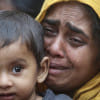
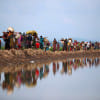
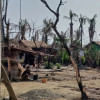
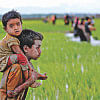


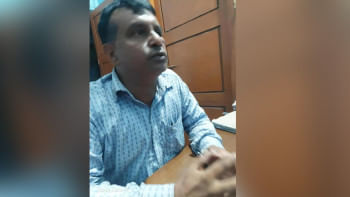
Comments